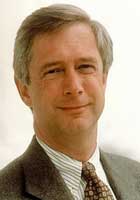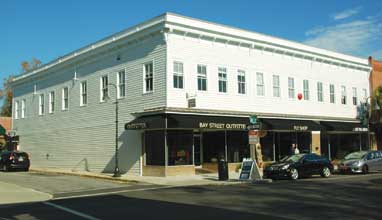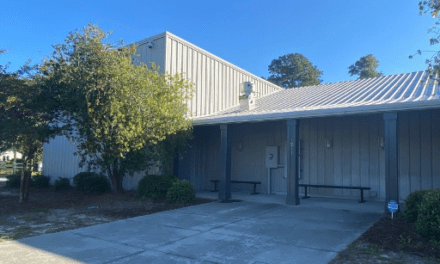 Sewanee president and scholar of the American South, Dr. John McCardell, spoke with our editor about his part in the upcoming Tricentennial Lecture Series at the Parish Church of St. Helena.
Sewanee president and scholar of the American South, Dr. John McCardell, spoke with our editor about his part in the upcoming Tricentennial Lecture Series at the Parish Church of St. Helena.
Last January, our features editor Mark Shaffer had the privilege (and fun) of sitting down for a chat with Beaufort historians Larry Rowland and Steve Wise prior to the second round of Tricentennial Lectures at USCB. The good doctors were still basking in the glow of the wildly successful first round of lectures, from which literally hundreds of people were turned away for lack of space. As Mark put it at the time, it was “the small town equivalent of a smash Broadway show… An encore presentation wasn’t simply necessary, it was practically mandated. The trio of scholars has agreed to take the stage once again in what can only be described in certain circles as Beatles-esque.”
Missing from Mark’s meeting that day was the third scholar, Dr. John McCardell, who had just been named the 16th Vice Chancellor and President of Sewanee: The University of the South – my alma mater, incidentally. The three historians are now preparing for round three (“Beaufort: A Look Back – 1712 – 1863,” beginning January 7th), and Dr. McCardell was kind enough to speak with me over the holidays, via email, about his part of the lecture series, which will focus mainly on the Parish Church of St. Helena. A lifelong Episcopalian, he also shared his thoughts on the “challenging time” in which the Episcopal Church finds itself today.
ME: Dr. McCardell, you’re a lifelong Episcopalian, a scholar of the American South, and the new Vice Chancellor of Sewanee, a university founded in the mid 19th century by the Episcopal Church. You also have a second home here in Beaufort, where you attend the Parish Church of St. Helena when you’re in town. It’s an understatement to say you seem uniquely qualified to talk about the history of the Church here in Beaufort. Your first lecture will focus on St. Helena’s Parish – founded in 1712 – during the Colonial period. Is there anything you can tell our readers about the church during this era that might whet their appetite to learn more?
JM: Where to begin?! This is, above all, a story of courage and faithfulness through good times and bad, and a story of perseverance in the faith often at moments of extraordinary external challenge.
Beaufort, founded in 1711, as many of your readers know, is the second oldest town in South Carolina. Under the terms of the Church Act of 1706, Anglican parishes in South Carolina were to be the units of government as well as centers of worship. Thus, within a year, by 1712, the Anglican Parish of St. Helena was created to serve this dual purpose for Beaufort and the Sea Islands. The Vestry of St. Helena’s thus had broad powers to tax, to hold elections, for example, as well as to conduct regular worship services.
The Rev. William Guy served as the first minister at St. Helena’s. Technically he was a missionary of the Society for the Propagation of the Gospel in Foreign Parts. The assignment to this, “the most remote Parish in the country,” as he described it, posed considerable challenges. In his first report back to the SPG in 1714, Rev. Guy noted that he had fourteen communicants, while there were also “several dissenters” in Beaufort. “As to the heathen and Infidels,” he added, “the number being in my Parish are 270.”
ME: Wow. So this was some pretty serious mission work.
JM: The early years were quite hazardous. Not until 1724, toward the end of the Yemassee Indian War, was the first church building constructed. In 1725, responding to a request for “a sober and learned person to be our minister,” the Bishop of London sent the Rev. Lewis Jones, who served energetically for almost 20 years. In 1734 Captain John Bull presented St. Helena’s a memorial gift of Communion silver, in memory of his wife, who had died during the Yemassee War. The silver is still in use today.
Perhaps most interesting, and evidence of what would become a recurrent feature of life in St. Helena’s, was the Great Awakening, a revival that swept through the American colonies in the 1730s and 1740s. Both John Wesley and George Whitefield preached in this area to large gatherings.
By the eve of the Revolution, there were 22 parishes in South Carolina; and a system of local self-governance, through the vestries, had developed that made concerns over taxation without representation resonate through the colony. And of course, the Diocese of South Carolina, older than the Union itself, was one of the nine founding dioceses of the Protestant Episcopal Church in the United States. It is so commemorated on the official flag of the Episcopal Church.
ME: Your second lecture will focus on the Great Beaufort Revival of 1831. According to The History of Beaufort County, SC, Part I, written by your fellow lecturer, Dr. Larry Rowland, “Nearly a whole generation of wealthy and influential young planters and professional men were swept away by the religious fervor that began with this revival. Six men from one law firm abandoned their profession to take up the ministry in various denominations.” That’s a pretty amazing story. How significant – and how lasting – an impact did this “Great Revival” really have on the Beaufort area?
JM: I believe the 1831 revival played a central role not only for St. Helena’s but for the South as a whole. It occurred at a critical moment, spoke to both latent and manifest concerns that were spiritual, economic, social, and political. It was a transforming event. It is enough to say that during the period 1830-32, the South experienced a slave rebellion (Nat Turner, in Virginia), a political and economic crisis over the tariff (Nullification), a social crisis (the founding of the abolitionist Liberator by William Lloyd Garrison), and a total eclipse of the sun.
ME: And I thought 2010 was a tough year!
JM: More to the point, this event changed everything. It brought many souls to Christ. It led many Beaufortonians into the ministry. It defined the long and faithful rectorship of the Rev. Joseph Walker, who served (incredibly) from 1823 to 1878 (just think of all that he witnessed). And it defined St. Helena’s as a place where study, teaching, and preaching of the Word were paramount, where St. Paul’s admonition to Timothy not to be distracted by the quarrels that this world places in our way is heeded, and where all sinners, which is to say every single human being – no exceptions – are welcomed.
ME: Speaking of the “quarrels that this world places in our way”… As the new President of Sewanee, you have said, “Our goal must be not to become more like someplace else, but to be a better, stronger, truer version of what we are: The University of the South.” Reading those words, I can’t help thinking that Sewanee’s founding institution, the Episcopal Church, has been struggling with an identity crisis of its own… seeking to become a better, stronger, truer version of what it is amid great disagreement about what that means. At the risk of putting you in an awkward position, I’d love to hear your thoughts on the state of the Episcopal Church today… and its future.
JM: It is a challenging time, isn’t it? I would have several responses, all perhaps somewhat oblique. They would all be scriptural. The first, from II Timothy: “Don’t have anything to do with foolish and stupid arguments, because you know they produce quarrels. And the Lord’s servant must not quarrel; instead he must be kind to everyone, able to teach, not resentful. Those who oppose him he must gently instruct, in the hope that God will grant them repentance leading them to a knowledge of the truth, and that they will come to their senses and escape from the trap of the devil, who has taken them captive to do his will.”
The second, from Ephesians: “For it is by grace you have been saved, through faith – and this not from yourselves, it is the gift of God – not by works, so that no one can boast.”
And finally, from the great Sewanee theologian William Porcher DuBose, who at the end of his life observed, “If you say that one shall make no mistakes, shall fall into no errors, then you say that he shall not know the truth for himself nor live a life that is his own. If you say that he must go out of the Church to make his mistakes or exploit his errors, then you have legislated that within the Church one must live a life that is not his own; for we cannot make even the Church’s life our own unless we are free in doing so. If there is no freedom of error within the Church, then there is no freedom of truth.
“I see all that is divine and permanent in Christianity, in my Christian Creed, in a clearer light, in better perspective and truer proportions, than I ever did before. What if on the natural edges and joinings of it, as I have said, all is not perfectly even yet clear and smooth – I have learned to hold my mind in suspense upon matters which we have eternity in which to know, and to know which eternity will not be too long.”
Read more about the Tricentennial Lecture Series at St. Helena’s Episcopal Church.





